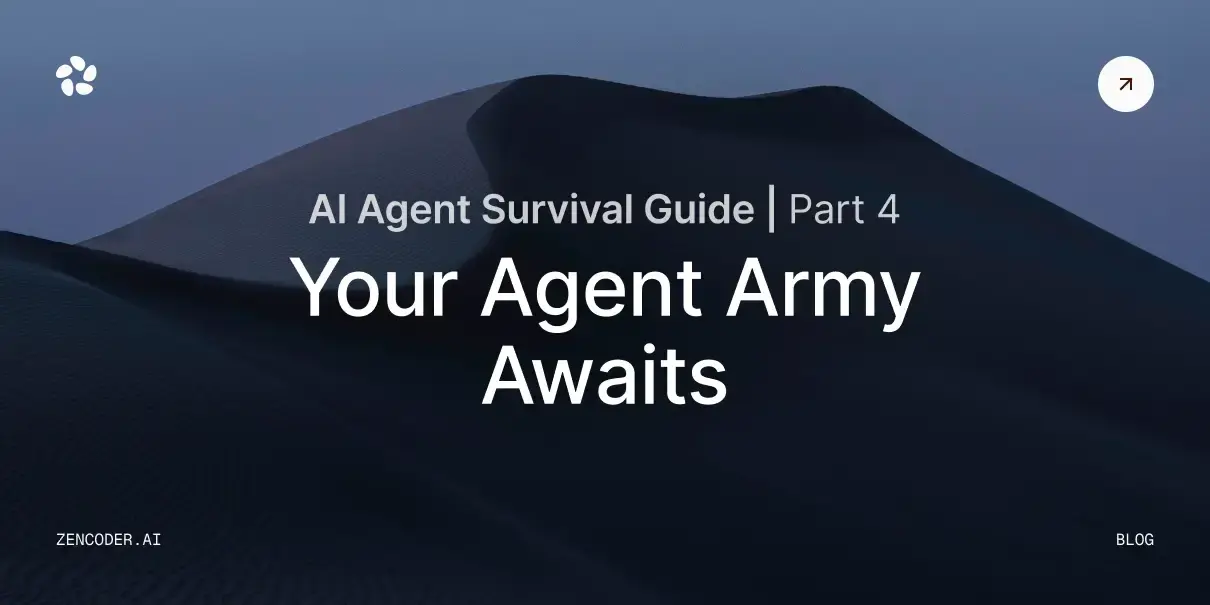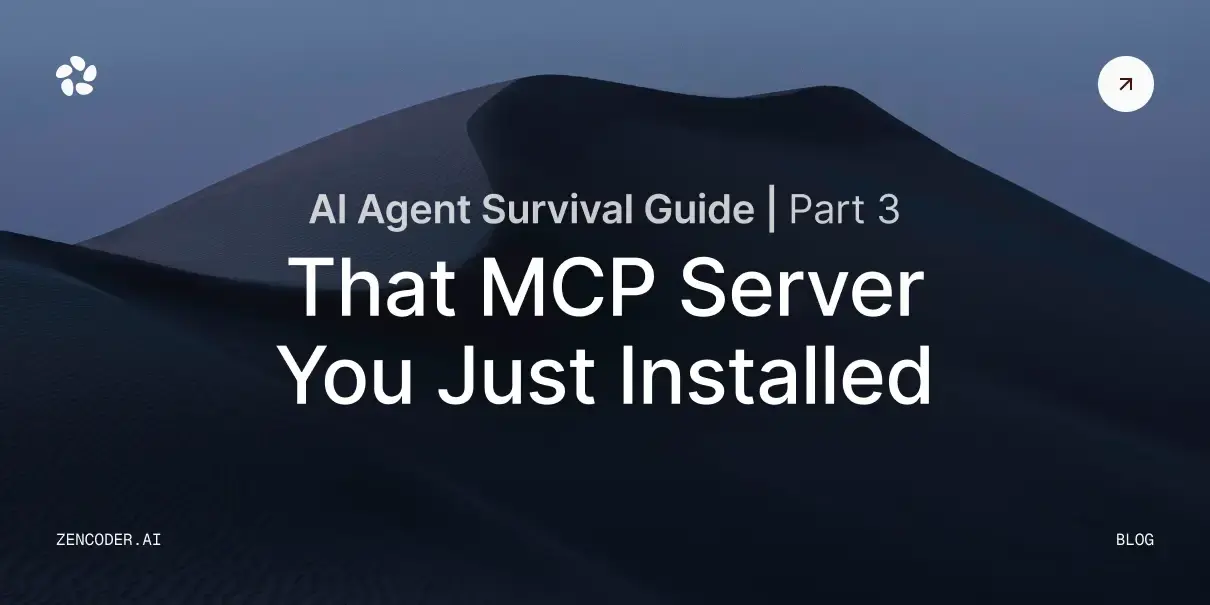I remember the first time my team experimented with AI code generation. We used the old OpenAI Codex and were amazed at how quickly it could turn high-level ideas into code. From the very first hours of use, it already streamlined our workflow remarkably.
That was 2021.
Today, AI code generators are even more powerful. Besides handling complex tasks such as generating entire functions and writing tests, they can operate as autonomous AI agents. They’re also more popular than ever, with over 50% of developers using them daily.
AI code generation is more than a technological novelty. It’s a pivotal advancement actively redefining software engineering. Understanding its core functionalities is paramount to leveraging its full potential.
This article will explain all you need to know about AI code generation — from the technologies powering it to the predictions for its future.
What Is AI Code Generation and How Does It Work?
AI code generation is a groundbreaking technology.
By employing sophisticated algorithms and extensive training datasets, AI code generators bridge the gap between human intention and machine execution. Developers provide high-level input, and the AI translates it into code almost instantaneously. The result: significant gains in productivity and reduced development time.
At its core, AI code generation relies on machine learning, large language models (LLMs), and natural language processing (NLP). These technologies allow the AI to understand and generate code based on human language instructions, bringing an unprecedented level of automation to coding tasks.
To generate code, AI typically goes through the following steps:
- Training on massive datasets of existing code
- Learning patterns and conventions
- Predicting what code should come next based on context and prompts
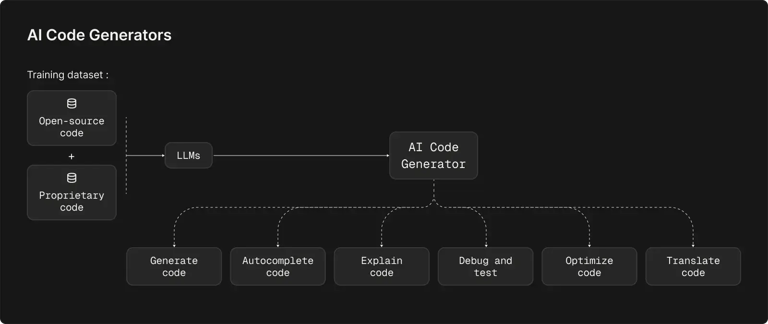
Source: Indeed
Core Technologies in AI Code Generation
AI code generators operate on a few key technologies:
- Machine learning (ML)
- Large language models (LLMs)
- Natural language processing (NLP)
Machine learning (ML)
This is the foundation of AI code generation. Models learn from code so they can detect patterns, predict completions, and adapt to new contexts.
Choosing the right ML model is essential for high-performance code generation and complex tasks like bug detection. Models must be trained on diverse datasets encompassing a variety of programming languages and coding paradigms.
Large language models (LLMs)
Large Language Models (LLMs) are advanced AI systems designed to understand and generate human-like text and code based on vast datasets. Contemporary models like Gemini and GPT-4 are trained on billions of lines of code.
LLMs are built on transformer architecture, which uses attention mechanisms to maintain context across long sequences. Because of that, they can understand how code flows across functions and files. Once they’re trained and have broad knowledge, LLMs can be fine-tuned on specific codebases and domains so they can suit particular use cases.
Some tools take it a step further. For example, Zencoder runs a proprietary repair pipeline that analyzes and corrects LLM-generated code automatically. This step allows it to reduce errors and improve code quality before presenting it to the developer.
Natural language processing (NLP)
With NLP, models can understand plain human language prompts and transform them into functional code. These technologies collectively empower AI code generators to not only produce code autonomously but also adapt and improve through continuous learning.
Through NLP, developers can effortlessly convert their ideas into executable code, whether it’s in common programming languages or structured formats like YAML. This transformation amplifies productivity and minimizes the risk of misinterpretation.
NLP also powers emerging applications, such as ChatGPT for recruiters, where natural language queries can generate job descriptions, candidate screening prompts, and outreach templates with high precision.
What Are AI Code Generators Capable Of?
AI code generators offer several key functionalities. The main one is real-time code completion, where the AI predicts and suggests code snippets as you type. They also excel at transforming natural language inputs into executable code, making coding more accessible to those less familiar with syntax.
Today’s tools go beyond code generation, though. They assist with code refactoring and optimization — analyzing existing code to improve efficiency, readability, and maintainability.
Real-Time Code Completion
Code completion is one of the most transformative and widely used features of AI code generators.
By predicting and suggesting continuations for code lines in real time, these tools:
- Substantially accelerate the coding process
- Reduce the need for tedious boilerplate code writing
The AI learns from your codebase to offer contextually relevant suggestions. It understands variable names, project structure, and coding patterns and then predicts code — from the next characters to entire blocks of logic.
Natural Language to Code
Natural language to code is a feature that allows users to describe what they want in plain English and receive functional code in return. This bridges the gap between human intent and syntax that machines can read, making development faster and more accessible. The accuracy and versatility of natural language to code have improved significantly over the years and will only continue to do so.
The 3 Biggest Benefits of AI Code Generation
The benefits of AI code generation are extensive, positioning it as an invaluable asset in modern software development. Most notable ones include:
- Increased productivity
- Improved code quality
- Lower barrier to entry
Increased Productivity
Increased productivity stands as a cornerstone benefit of AI code generation.
Tools like Zencoder, GitHub Copilot, and Amazon Q Developer deliver code snippets and problem-solving suggestions instantaneously, surpassing humans in speed. Developers now need to spend much less time and effort on manual, repetitive, and tedious work.
Instead, they can allocate more time to intricate aspects of their projects, such as:
- Architecture
- Logic
- Innovation
- Complex problem-solving
According to Index’s 2025 report, teams save about 30–60% of time when using AI tools. Additionally, some companies report a 25–30% productivity boost as a result of implementing AI, whereas the gains were 10% for basic code assistants.
These benefits make a world of difference for small teams navigating tight deadlines and budget constraints. They lead to faster development cycles, iteration, and time-to-market for software products and features.
Embracing AI-driven coding no longer means having a competitive edge but rather keeping up. One report estimates that about 40% of all code in 2025 was AI-generated or AI-assisted. Also, Sundar Pichai himself stated that over 30% of Google’s new code was created with the help of AI.
Improved Code Quality
AI code generation can enhance the overall quality of software by incorporating best coding practices. Here’s how it helps:
- Consistent code standards: AI tools adhere to set coding standards, leading to uniform and predictable code quality.
- Faster error detection: AI can identify common programming mistakes and bugs before they reach production. In one experiment, an AI caught 89% more bugs than senior developers.
- Enhanced review process: AI tools, such as Zencoder’s Code Review Agent, can analyze pull requests and suggest improvements.
- Performance optimization: AI can suggest how to improve speed, memory usage, and maintainability.
Combining AI-assisted coding with human oversight results in high-quality and maintainable code that teams can trust.
Lower Barrier to Entry
With AI-driven tools, even beginner developers can quickly get up to speed and contribute meaningfully to software projects.
AI code generation tools can translate plain text into working code and provide instant help and suggestions. This reduces the steep learning curve traditionally associated with coding, makes the field more accessible, and fosters a more inclusive developer community.
In turn, the tech industry benefits from a wider talent pool. With a lower barrier to entry, the field becomes more diverse, and innovative solutions can emerge from varied perspectives and backgrounds.
Challenges of AI Code Generation
Despite its benefits, AI code generation presents challenges, particularly when it comes to code quality, maintainability, and technical debt. AI tools still require constant review and vigilance.
AI-generated code comes with several quality concerns:
- Lack of consistency: AI may not always follow best practices and project-specific standards, leading to inconsistent, harder-to-read code.
- Hidden errors: Even if it runs and complies with standards, AI code can still contain bugs that can surface later and cause costly delays.
- Poor optimization: AI code may not always be optimized for performance and scalability.
- Missing documentation: AI code typically lacks comments and contexts, so future developers may not be able to understand and modify it easily.
If AI code is merged with the product without proper code review and consistent human oversight, issues can accumulate as technical debt. The result:
- A bloated, fragile codebase
- Reduced quality and sellability of the product
- Long, tiresome debugging sessions
- Loss of profit and reputation damage
To prevent these problems, developers should treat AI code as a first draft, not a final product.
The Continued Importance of Developer Skills
AI tools improve productivity, but they still can’t replace the need for human expertise. It’s still essential for:
- Translating nuanced business needs into precise code specifications
- Checking AI code against quality and security standards and engineering best practices
- Solving complex technical and structural issues that AI cannot
- Ensuring the sustainability and adaptability of codebases over the long term
- Assessing the ethical implications and consequences of AI-generated code
Over-reliance on AI can also hinder skill development, especially in junior developers who may miss opportunities to build problem-solving abilities.
Ethical Considerations in AI Code Generation
AI code generation presents exciting possibilities for developers, but it also raises ethical concerns that users must consider:
- Training data bias: AI learns from existing code, which may contain biases in areas like algorithmic assumptions and variable naming. Models may then generate code that perpetuates these problematic patterns.
- Data privacy issues: AI code generators, especially cloud-based ones, process the code users write. When you use AI for business purposes and share sensitive project information, there’s a risk of it ending up on third-party servers. To avoid this, organizations should impose strict rules on code privacy and consider local alternatives.
- Copyright and licensing: Most models are trained on publicly available code, such as open source repositories with various licenses. The code they generate may sometimes resemble training data closely, which raises legal concerns. There are over 30 AI copyright infringement lawsuits active today.
- Security risks: AI-generated code may contain security vulnerabilities. The reason could be poor training data or the lack of knowledge of context-specific risks. Security reviews should be commonplace for all developers and organizations using AI to code.
An ethical approach requires balancing the benefits of innovation with the responsibility to uphold industry standards and best practices. In other words, it’s important to promote transparency in AI processes, review output carefully, and stay informed about the evolving legal and industry standards.
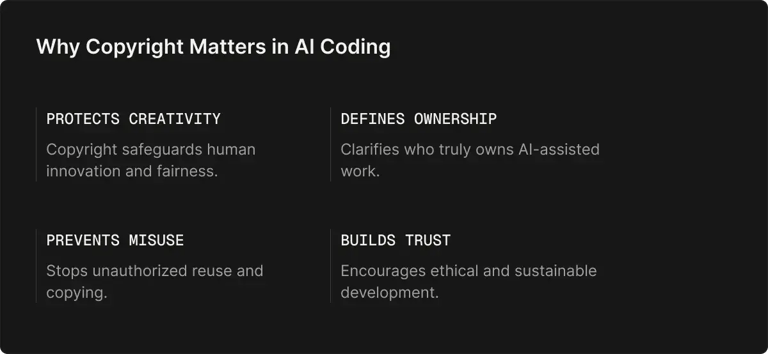
Source: Selleo
Cost of AI Code Generation
AI code generators, including popular ones like GitHub Copilot, Amazon Q Developer, and Zencoder, typically require a subscription. Most offer several tiers, including a limited free plan and paid plans, such as those for individuals, teams, and enterprises. The monthly cost of these plans ranges from $10 to several hundred dollars.
Besides the subscription, other costs tend to emerge with AI code generation. For example, a business may need to invest in the integration of AI into workflows, prompt training for developers, stricter security, domain registration, and scaling.
On-premise AI solutions require much larger and long-term financial commitments. From developing and maintaining AI infrastructure to procuring datasets and computational resources — these expenses can add up.
While AI code generation can enhance efficiency, it’s important to consider whether the benefits justify the costs. Tracking metrics such as saved time and code output allows teams to evaluate the ROI.
Types of AI Code Generation Tools
AI code generators come in many shapes and sizes to suit different teams, workflows, and use cases:
- Integrated development environment (IDE) extensions are built into existing editors — this is the most common approach today
- AI-native editors are built from the ground up, with the AI being at the core of the product
- Browser-based IDEs offer AI assistance within a browser environment, which makes them accessible and easy to use
- Chat interfaces can generate code and debug through natural conversation
- Autonomous agents are the newest development in AI coding, and they can write, test, and iterate independently
Popular AI Code Generation Tools
AI coding tools that have seen the biggest adoption include:
|
AI Code Generator |
Type |
Description |
|
Zencoder |
IDE extension |
|
|
IDE extension + autonomous agent |
|
|
|
ChatGPT |
Chat interface |
|
|
Amazon Q Developer |
IDE extension |
|
|
Gemini Code Assist |
IDE extension |
|
|
Tabnine |
IDE extension |
|
|
Cursor |
AI-native editor |
|
|
Replit |
Browser IDE |
|
|
OpenAI Codex (2025 relaunch) |
Autonomous agent |
|
|
CodeWP |
Specialized tool |
|
Choosing an AI Coding Tool
Earlier tools were tailored to specific programming languages and paradigms, so the options were limited depending on the intended use. This is no longer the case. Today’s AI code generators support numerous languages and paradigms, including static and dynamic typing and object-oriented and functional approaches.
Nowadays, the more relevant factors for choosing an AI coding generator include ecosystem preference, privacy needs, and output quality. For example, teams using AWS will naturally gravitate towards Amazon Q Developer, whereas Gemini Code Assist will suit Google Cloud users. Also, teams prioritizing accuracy over speed will benefit most from Zencoder and its proprietary repair pipeline.
Evolution of AI Code Generation
The journey of AI code generation is nothing short of transformative.
It all began in 2017, when massive advancements in machine learning algorithms, particularly deep learning, propelled AI's capability to understand and generate code. As a result, AI language models quickly became more sophisticated and capable. GPT-2 was released in 2019, and GPT-3 the following year.
The turning point was in 2021 when OpenAI Codex and GitHub Copilot arrived. They were the first tools to allow AI code generation within existing developer workflows. Suddenly, millions of people were using AI daily.
Progress was lightning-fast from there. In 2022, ChatGPT popularized conversational coding assistance, whereas models with superior reasoning, such as GPT-4 and Claude, arrived in 2023.
Today, AI tools can not only generate code but operate independently, akin to junior developers, requiring less human intervention than ever. They can understand context, refactor code, suggest optimizations, and integrate into every major IDE.
Future of AI Code Generation
In the near future, AI code generation will likely move toward:
- Deeper integration: We can expect greater integration with CI/CD pipelines, deployment systems, testing frameworks, and project management software.
- More autonomy: Future AI agents will be able to handle larger and more complex tasks spanning multiple files, services, and repositories.
- Improved reliability: With advances in verification, testing, and repair workflows, tools will increasingly produce code with fewer errors.
- Specialization: AI tools will become more tailored for specific domains, such as security and infrastructure.
These advancements could lead to even faster development cycles, greater productivity, and more robust applications.
AI Code Generation — Key Takeaways
- AI code generators use sophisticated algorithms and extensive training datasets to produce code based on human input.
- They improve efficiency and code quality, and make coding accessible to a wider population.
- Various AI coding tools are available today. To choose the right one, individuals and teams should consider factors like their preferred cloud ecosystem, use case, budget, and security requirements.
- AI code generation has come a long way and shows no signs of slowing down. What was once a simple code completion tool can now execute tasks independently, and will likely become more powerful soon.
- While existing AI tools still require human oversight to ensure the code is error-free and meets security and ethics standards, this may change soon. Tools like Zencoder show us that high reliability with AI is possible even today.
With its AI engineering agent and newly released Zenflow workflow brain, Zencoder is capable of orchestrating complex, multi-step tasks with the precision of a senior developer. Zencoder can analyze your entire codebase to uncover logic and patterns, and then complete, generate, verify, and fix code in your stead.
 Source: Zencoder
Source: Zencoder
If your team is looking to scale its output without compromising on code integrity, Zencoder is the way to go. Try Zencoder today and stay ahead of the curve with cutting-edge AI code generation technology.
Frequently Asked Questions
What Does AI Code Look Like?
AI-generated code is typically indistinguishable from human-written code. It follows standard syntax and conventions, and can be as small as a single line or as big as an entire function.
The quality of AI code varies. At its best, it looks clean and idiomatic, fitting naturally into the codebase. At its worst, it’s compliant but contains bugs and ignores edge cases and project requirements. Because of this variance, human review remains essential.
You can see an example of AI code in Zencoder below:
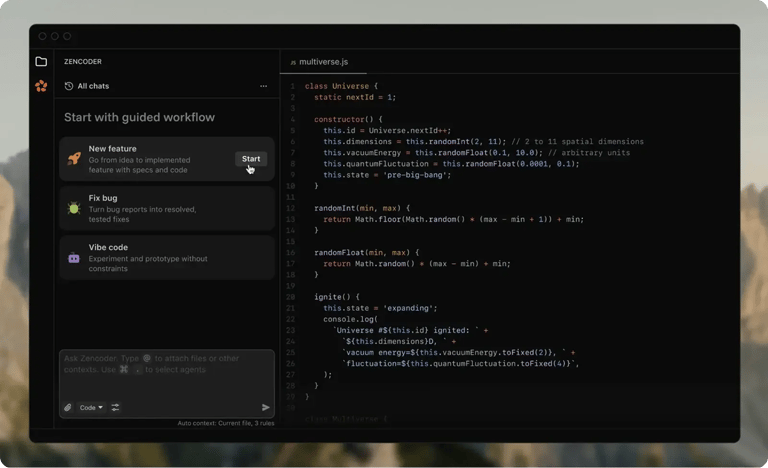
Source: Zencoder
Can AI Code Better Than Humans Can?
AI code generators are highly capable — they can produce large amounts of functional code and do so at lightning speed. However, this code can sometimes contain critical errors, lack optimization, or infringe on copyright laws.
Also, AI won’t be able to match the contextual understanding, critical judgment, and creativity of seasoned developers anytime soon.
What’s The Best AI Code Generation Tool?
With so many amazing tools available, it’s important to consider several factors, such as your preferred use case, cloud, and budget.
For example, if you’re still learning, you may benefit from a chatbot with a free tier like ChatGPT. On the other hand, Zencoder is ideal for teams that require a full coding system with high precision, scalability, and security.
How Much Does AI Code Generation Cost?
The cost of AI code generation varies greatly. Some tools, such as ChatGPT and Gemini, offer free tiers that may be sufficient for beginners. Professionals and teams usually need to upgrade to a paid tool, which may cost anywhere from $10 to over $100 per month. For companies requiring enterprise or on-premise solutions, the expenses can be well into the thousands.
How Do You Use AI Code Generators?
Getting started with AI code generation is simple, no matter if you’re using a chatbot or an IDE-integrated tool like Zencoder:
- Create an account on the provider’s platform.
- A chatbot will allow you to use it immediately by typing out your prompt in natural language.
- IDE extensions may require a few extra steps beforehand, such as installing a plug-in for real-time autocompletion.
- Once you submit your prompt, the AI should respond within seconds.
- You can then iterate with prompts until you get optimal results.
- Don’t forget to review the code thoroughly before deployment.



